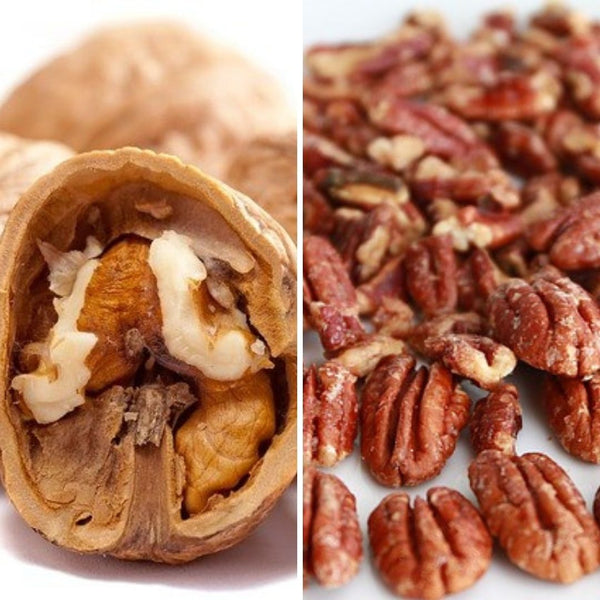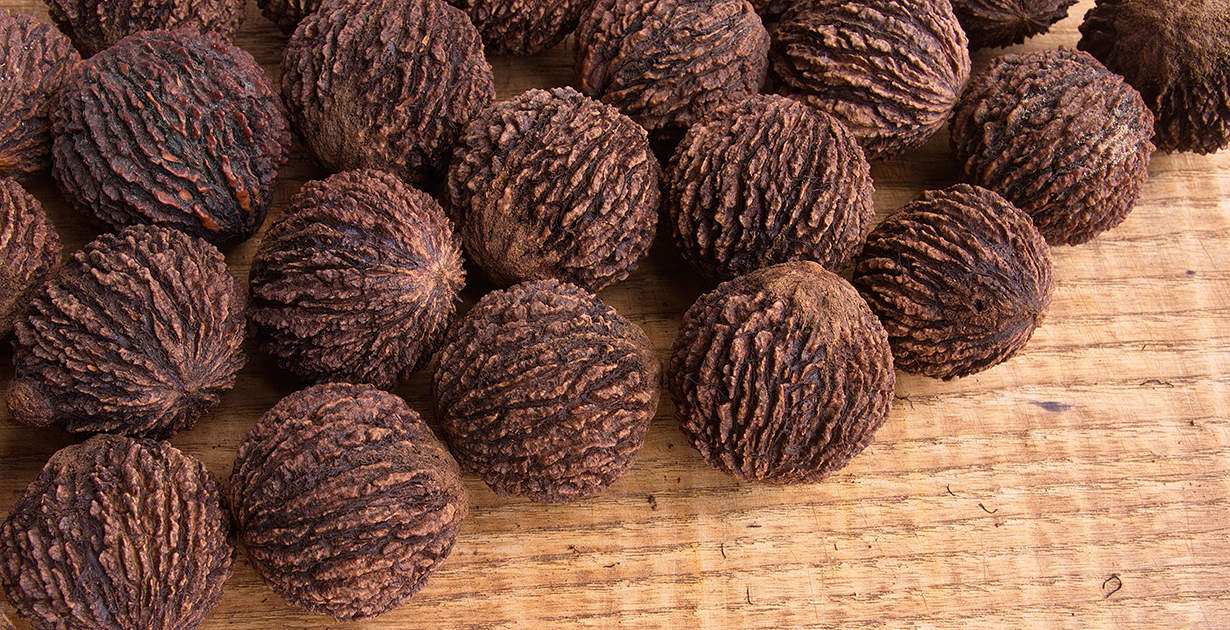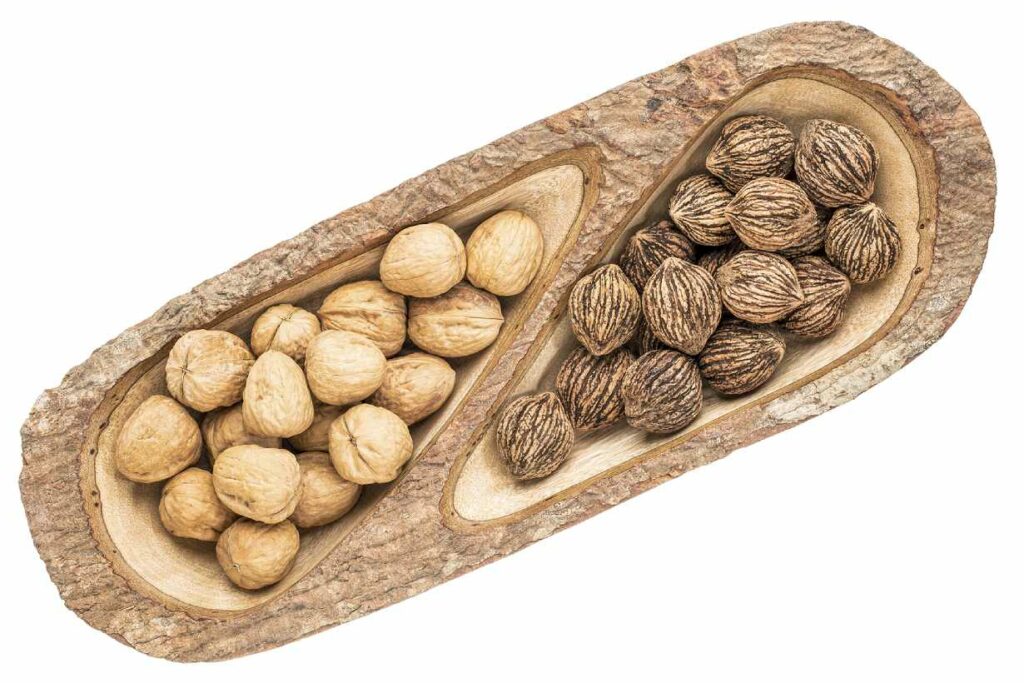Introduction

Walnuts and black walnuts are two popular varieties of nuts that are known for their nutritional value and health benefits. While they may have similar names, these nuts have distinct characteristics and flavor profiles that set them apart. Understanding the differences between walnuts and black walnuts can help you choose the right variety for your culinary needs and health goals. In this article, we will explore the unique qualities of both walnuts and black walnuts, compare their nutritional benefits, and provide tips on how to incorporate them into your diet. Let’s dive in and discover the world of these delicious and nutritious nuts.
Overview Of Walnuts And Black Walnuts
Walnuts and black walnuts are two distinct varieties of nuts that offer unique flavors and characteristics. Walnuts, also known as English walnuts, are commonly found in orchards and have a mild, slightly sweet taste. They have a thin shell that is easy to crack and are widely used in both sweet and savory dishes. On the other hand, black walnuts are the only all-wild tree nut in the United States and have a rich, bold flavor. They have a tough, thick shell that requires more effort to crack. Black walnuts are often used in baking and are prized for their earthy taste. Both walnuts and black walnuts provide various nutritional benefits and can be incorporated into a healthy diet.
Nutritional Value And Health Benefits
Walnuts and black walnuts are both packed with essential nutrients and offer numerous health benefits. They are a rich source of protein, fiber, healthy fats, vitamins, and minerals. Walnuts and black walnuts contain antioxidants that help reduce inflammation and protect against oxidative stress. Research has shown that incorporating these nuts into a balanced diet can improve heart health, support brain function, aid in weight management, and lower the risk of chronic diseases such as diabetes and cancer. Additionally, they provide important nutrients like omega-3 fatty acids, vitamin E, and magnesium, which are essential for overall well-being.
Walnuts

Walnuts are a popular and versatile nut known for their mild flavor and crunchy texture. They are commonly used in both sweet and savory dishes, making them a staple in many cuisines around the world. Walnuts are packed with essential nutrients, including protein, fiber, healthy fats, vitamins, and minerals. They are also a rich source of antioxidants, which help reduce inflammation and protect against oxidative stress. Incorporating walnuts into a balanced diet has been shown to improve heart health, support brain function, aid in weight management, and lower the risk of chronic diseases. Whether enjoyed on their own as a snack or added to salads, desserts, or even main courses, walnuts offer a delicious and nutritious addition to any meal.
Characteristics And Taste Profile
Black walnuts have unique characteristics that set them apart from English walnuts. The shells of black walnuts are thicker and tougher to crack compared to English walnuts. Additionally, black walnuts tend to have a stronger and more earthy flavor compared to the milder taste of English walnuts. The bold flavor of black walnuts adds a distinctive and rich nuttiness to dishes. However, the strong taste may not appeal to everyone and may require some experimentation to find the right balance in recipes.
Culinary Uses And Recipes
Walnuts and black walnuts are both versatile ingredients that can be used in a variety of culinary creations. Walnuts are commonly used in both sweet and savory dishes, adding a rich and nutty flavor. They can be chopped and added to salads, used as a topping for oatmeal or yogurt, or incorporated into baked goods such as cookies and breads. Black walnuts, with their stronger and earthier taste, are often used as a garnish for desserts, sprinkled over ice cream or incorporated into cakes and pies. Both varieties can also be used in pestos, nut butters, and as a crunchy addition to stir-fries.
Black Walnuts

Black walnuts are a unique variety of nuts that are known for their bold and distinctive flavor. Unlike English walnuts, black walnuts have a stronger and earthier taste, making them a favorite among those who enjoy a more intense nutty flavor. These nuts are harvested from black walnut trees, which are primarily found in the central and eastern parts of the country. The shells of black walnuts are thick and tough to crack, and they can leave behind a dark stain on your hands. To preserve the availability of black walnuts, companies like Hammons Black Walnuts are dedicated to cultivating and promoting this nut variety.
Unique Characteristics And Flavor
Black walnuts have unique characteristics that set them apart from other varieties. Their shells are thick and tough, making them harder to crack compared to English walnuts. Additionally, they leave behind a dark stain on your hands when handling them. The flavor of black walnuts is bold and earthy, with a distinctive nutty taste that is stronger than English walnuts. This intense flavor profile makes black walnuts a preferred choice for those who enjoy a more robust nutty flavor in their culinary creations.
Harvesting And Processing Methods
Harvesting black walnuts can be a labor-intensive process, but it’s worth the effort for the unique flavor they bring. To harvest black walnuts, the nuts need to be gathered from the ground once they have fallen from the trees. The outer husks need to be removed, which can be done by placing them in a sack and driving over them or by soaking them in water. Once the husks are removed, the nuts need to be dried for several weeks or months until they are fully cured. This ensures that they can be stored for long periods without spoiling. Once dried, the nuts need to be cracked open with a nutcracker or hammer to access the rich, flavorful meat inside.
Health Benefits

When it comes to health benefits, both walnuts and black walnuts offer a range of nutrients that can support overall well-being.
- Nutritional Benefits: Walnuts and black walnuts are rich in omega-3 fatty acids, antioxidants, and essential minerals like magnesium and potassium.
- Heart Health: The high levels of healthy fats found in walnuts can help reduce cholesterol levels and lower the risk of heart disease.
- Brain Function: The antioxidants and omega-3 fatty acids in walnuts are believed to support brain health and improve cognitive function.
Incorporating walnuts and black walnuts into your diet can provide numerous health benefits and contribute to a balanced and nutritious eating plan.
Comparison Of Nutritional Benefits
When comparing the nutritional benefits of walnuts and black walnuts, there are some notable differences. In a 1/4 cup serving, black walnuts provide 6.8 grams of protein, which is 57% higher than the protein content of English walnuts. Black walnuts also contain lower amounts of total fat, polyunsaturated fat, and saturated fat, while having a higher concentration of monounsaturated fat, which is considered a healthy fat. Both varieties have a similar calorie content, with black walnuts being slightly lower. Incorporating either of these nuts into your diet can provide essential nutrients for overall health and well-being.
Impact On Heart Health And Brain Function
Both walnuts and black walnuts have been shown to have positive effects on heart health and brain function. The high levels of omega-3 fatty acids found in these nuts are known to reduce inflammation and improve cardiovascular health, including lowering cholesterol levels and reducing the risk of heart disease. Additionally, the antioxidants found in both varieties of nuts can help protect brain cells from oxidative stress and improve cognitive function. Incorporating walnuts or black walnuts into your diet can have significant benefits for both your heart and brain health.
Culinary Uses

Walnuts and black walnuts are versatile ingredients that can be incorporated into a wide range of culinary creations. They can be used in both sweet and savory dishes, adding a rich and nutty flavor. Walnuts are commonly used in baked goods, such as cakes, cookies, and breads, as well as in salads and as a topping for oatmeal or yogurt. Black walnuts have a more intense and earthy flavor, making them perfect for adding depth to dishes like pasta, vegetable stir-fries, and even ice cream. Both nuts can also be ground into a paste or used as a garnish to enhance the overall taste and texture of various dishes.
Recipes And Cooking Tips For Walnuts And Black Walnuts
Walnuts and black walnuts are incredibly versatile in the kitchen and can be used in a variety of recipes. For walnuts, they are commonly used in baking, such as in cakes, cookies, and breads. They also make a great addition to salads, adding a delightful crunch and nutty flavor. As for black walnuts, their intense earthy flavor pairs well with pasta dishes, stir-fries, and even ice cream. Additionally, both nuts can be ground into a paste or used as a topping to enhance the taste and texture of various dishes. Whether you’re looking for a sweet or savory dish, walnuts and black walnuts can elevate your culinary creations.
Incorporating Nuts Into Various Dishes
Incorporating nuts into various dishes allows for an added crunch, texture, and nutty flavor. Walnuts and black walnuts can be used in a multitude of recipes, both sweet and savory. They can be sprinkled over salads, oatmeal or yogurt bowls, or added to granola and trail mixes. Nuts can also be used as a coating for proteins like chicken or fish, adding a crispy element. In baking, nuts can be incorporated into cookies, cakes, and breads. They can also be ground into a paste for use in sauces, dips, or spreads. The possibilities are endless when it comes to incorporating nuts into your favorite dishes.
Conclusion

In conclusion, the comparison between walnuts and black walnuts reveals distinct characteristics and nutritional profiles. While black walnuts offer a unique flavor and higher concentration of monounsaturated fat, walnuts have been extensively studied for their health benefits. Incorporating both varieties into our diets can provide a range of culinary possibilities and added texture to dishes. However, more scientific studies are needed to fully evaluate the potential health benefits of black walnuts. Ultimately, choosing the right nut variety depends on personal preference and dietary needs.
Key Differences Between Walnuts And Black Walnuts
Walnuts and black walnuts have distinct characteristics and flavors that set them apart. Here are the key differences between the two nut varieties:
- Flavor: Walnuts have a mild and slightly sweet taste, making them versatile for use in both sweet and savory dishes. On the other hand, black walnuts have a bold and intense flavor with earthy notes, making them ideal for adding a rich and distinct taste to recipes.
- Nutritional Profile: Black walnuts have a higher concentration of monounsaturated fat, providing potential heart-healthy benefits. Meanwhile, walnuts are well-known for their high omega-3 fatty acid content and antioxidant properties, which may support brain health.
- Appearance: Walnuts have a smooth, tan-colored shell, while black walnuts have a harder and darker shell with a rough surface.
- Availability: English walnuts are more commonly available in grocery stores and markets, while black walnuts are often found in specialty stores or directly from growers.
Incorporating both walnuts and black walnuts into your diet can add variety to your meals and provide unique flavors and nutritional benefits.
Choosing The Right Nut Variety For Your Needs
When deciding between walnuts and black walnuts, it’s important to consider your specific needs and preferences. If you’re looking for a versatile nut that can be used in a variety of dishes, English walnuts may be your best bet. They have a mild and slightly sweet taste, making them a great option for both sweet and savory recipes. On the other hand, if you crave a bolder and more intense flavor in your dishes, black walnuts offer a unique earthy taste. Keep in mind that black walnuts are harder to find and crack, so they may require more effort in preparation. Ultimately, the choice between walnuts and black walnuts comes down to personal preference and the specific flavors you desire in your culinary creations.
FAQ About Walnuts Vs Black Walnuts: Comparing Nut Varieties
Q: What is the main difference between walnuts and black walnuts?
A: The main difference lies in their flavor profiles and shell thickness. Walnuts have a milder taste and thinner shells, while black walnuts have a more robust, earthy flavor and thicker, harder shells.
Q: Are there any nutritional differences between walnuts and black walnuts?
A: Yes, there are slight differences in the nutritional profiles of walnuts and black walnuts. Black walnuts tend to have higher protein content and fewer carbs compared to regular walnuts.
Q: Can both walnuts and black walnuts be used interchangeably in recipes?
A: While they can be used interchangeably in some recipes, it’s important to note that black walnuts have a stronger flavor that may overpower certain dishes. It’s best to use them based on the recipe’s specific requirements or personal preference.
Q: Which variety of walnuts is more commonly found in grocery stores?
A: Regular walnuts are more commonly found in grocery stores due to their milder flavor and thinner shells, making them easier to crack and process for consumption.
Q: Are there any specific health benefits associated with consuming walnuts or black walnuts?
A: Both walnuts and black walnuts are rich in omega-3 fatty acids, antioxidants, and minerals, which have been linked to various health benefits such as heart health, brain function, and reducing inflammation. However, black walnuts may offer slightly higher levels of certain nutrients compared to regular walnuts.
Q: Can walnuts and black walnuts be stored in the same way?
A: Yes, both walnuts and black walnuts can be stored in a cool, dry place or in the refrigerator to extend their freshness. It’s important to store them in airtight containers to prevent them from becoming rancid or absorbing other odors.

Hot Pot Chinese Restaurant, located in Mechanicsville, MD 20659, is a culinary destination that offers a delightful array of Chinese cuisine. From the cozy ambiance to the delectable dishes, Hot Pot Chinese Restaurant is dedicated to providing an exceptional dining experience for all patrons. Since our establishment, Hot Pot Chinese Restaurant has been committed to serving the finest Chinese food, offering a diverse menu that caters to a wide range of tastes. Whether you’re craving traditional favorites like Kung Pao Chicken and Mongolian Beef or seeking out more adventurous options like Szechuan Spicy Hot Pot, our menu has something to satisfy every craving.